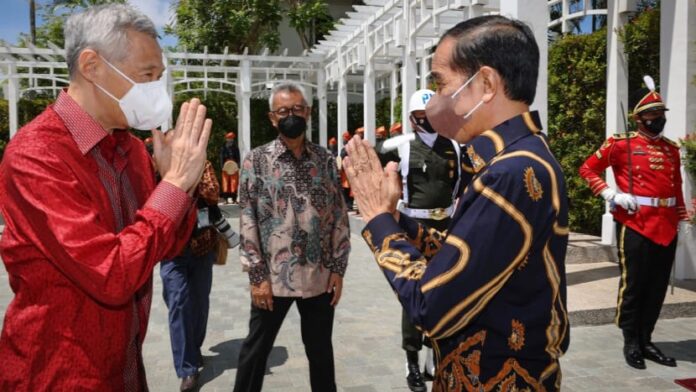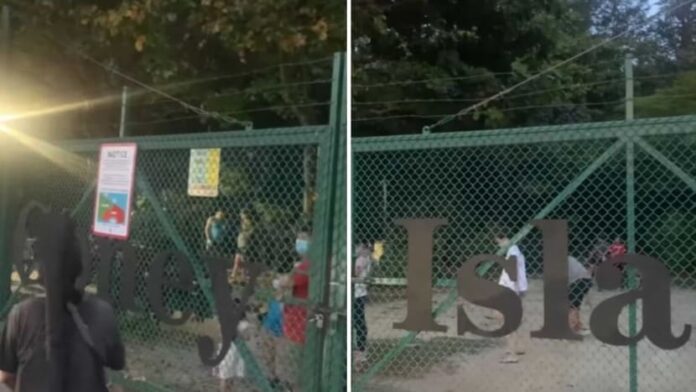Bintan: Singapore and Indonesia signed a “balanced” set of agreements to address “long-term” bilateral issues such as flight information regions (FIR), defence cooperation and extradition of fugitives, Prime Minister Lee Hsien Loong said on Tuesday (Jan 25).
Speaking at a joint press conference at the 5th Singapore-Indonesia Leaders Retreat with Indonesian President Joko Widodo, Mr Lee said the three issues were important to both sides.
“They have been on our bilateral agenda for decades. We have collaborated and discussed these issues many times before,” Mr Li said.
The two leaders had earlier witnessed the signing of the agreement at the Sanchaya resort in Bintan.
Mr Lee said at the last leaders’ retreat in October 2019, Mr Widodo and he had decided “it is time to decisively address these longstanding bilateral issues”.
“We have approved a framework that meets the needs and interests of both parties,” said Mr Lee, adding that Indonesia’s Coordinating Minister for Maritime Affairs and Investments Luhut Pandjaitan and Senior Minister of National Security and Coordinating Minister Teo Chee Hean were tasked with following up on detailed negotiations
“The conclusion of these agreements is a testament to the strength and maturity of Singapore’s relationship with Indonesia,” Mr Lee said.
“These agreements take into account the interests of both parties, represent a good balance of interests, and are long-lasting agreements designed to last at least a generation.”
The agreements also provide a “solid foundation” for the two countries to move forward with confidence in their bilateral relationship, Mr Lee added.
Readjustment of flight information area
Under an airspace management agreement, Singapore and Indonesia have agreed to realign the border between the Jakarta Flight Information Region (FIR) and the Singapore FIR.
Indonesia will authorize Singapore to provide air navigation services in parts of the airspace within the realigned Jakarta flight information region. The agreement is valid for 25 years and can be extended by mutual agreement.
In a joint press conference on Tuesday, Mr Li said: “The FIR agreement will meet the needs of the civil aviation of both countries and maintain the safety and efficiency of air traffic in a manner consistent with International Civil Aviation Organization (ICAO) rules.”
Indonesia has repeatedly expressed its desire to take over the flight information region over the Riau Islands, which has been managed by Singapore under ICAO mandates since 1946.
Singapore has repeatedly said that the FIR is not a question of sovereignty, but of the safety and efficiency of commercial air traffic.
Defense Cooperation Agreements and Extradition Treaties
Under the Defence Cooperation Agreement, Singapore and Indonesia will continue to strengthen their defence partnership and deepen cooperation in mutually beneficial areas. The agreement is valid for 25 years.
Commenting on the defence cooperation agreement, Mr Lee said it would strengthen cooperation between the armed forces of Singapore and Indonesia and advance defence relations between the two countries.
“The extradition treaty will strengthen cooperation in the fight against crime, sending a clear positive signal to investors,” he added.
Under the Extradition Treaty, Singapore and Indonesia will allow a comprehensive list of extraditable offences covered by the extradition treaty.
The treaty adds to Singapore’s extradition arrangements with global jurisdictions, including Commonwealth jurisdictions such as the United Kingdom, as well as reciprocal arrangements with Malaysia and Brunei Darussalam.
Singapore and Indonesia had earlier signed a package of extradition treaty and defence cooperation agreement in April 2007, witnessed by Mr Lee and Indonesia’s then-president Susilo Bambang Yudhoyono.
However, the two agreements have not yet been approved by Indonesia’s House of Representatives.
Mr. Li said on Tuesday that the two countries had exchanged letters and agreed that the latest three agreements would go into effect at the same time. “What remains is for both countries to complete our domestic processes to ratify and bring this package into effect,” he said.
He thanked Mr Widodo for bringing “very positive results” through his leadership and vision, and thanked officials from both sides “for their tireless efforts and shared determination to make progress on these long-standing bilateral issues”.
“I encourage ministers and officials to maintain close cooperation and coordination and to implement the agreement swiftly,” he added.
Cross-border travel
Mr Lee also said at the press conference that he had discussed with Mr Widodo to resume cross-border travel, noting that Indonesia had resumed tourist travel from Singapore to Bintan and Batam.
“It has implemented a travel bubble in Bintan and Batam and Singapore will discuss with Indonesia how to achieve two-way travel, which we hope will not take too long,” he said.
Mr Lee said he and Mr Widodo agreed to continue discussions on expanding air and sea travel to more destinations in Indonesia.
“But we have to take into account the COVID situation, especially the outbreak of the Omicron variant, and we will do so at a rate that is mutually acceptable given our respective public health situations,” Mr Lee said.
Bilateral cooperation
Mr Li said he and Mr Widodo also reviewed the ongoing bilateral cooperation between the two countries, noting that the two countries are strengthening institutional ties to deepen financial cooperation.
He continued that Singapore and Indonesia are also exploring new areas of cooperation such as sustainable development, green economy, digital economy and human capital development.
“Singapore has been Indonesia’s largest foreign investor since 2014, and despite the pandemic, our investments are growing,” Mr Lee said.
The two countries also signed several other bilateral agreements on Tuesday.
The Ministry of Finance of Singapore and Indonesia signed a Memorandum of Understanding (MOU) on Financial and Economic Cooperation.
The memorandum of understanding covers traditional cooperation fields such as customs cooperation and fiscal policy, as well as emerging fields such as financial services, climate finance, and digital economy.
The central banks of the two countries also signed a memorandum of understanding to strengthen bilateral cooperation and deepen relations.
The Monetary Authority of Singapore and Bank Indonesia said the MoU facilitates collaboration on projects related to payments innovation and enables collaboration within the expanded central banking and supervisory functions.
The Ministry of Sustainable Development and Environment (MSE) of Singapore and the Ministry of National Development of Indonesia also signed a memorandum of understanding on cooperation in developing a green and circular economy.
Potential areas of collaboration include resource optimisation and recycling programmes to address electronics, food and packaging waste including plastics.
The two countries also signed a memorandum of understanding on energy cooperation to further promote the energy transition in the two countries and regions.
In addition, the Ministry of Education (MOE) of Singapore and the Ministry of Education, Culture, Research and Technology of Indonesia signed the Human Capital Partnership Arrangement (HCPA) to deepen educational cooperation and connections between educational fraternities and students of the two countries.
“HCPA will also expand opportunities for Singaporean and Indonesian students to participate in overseas exchanges and internships to deepen their understanding of each other’s countries and prepare them to better engage with the region,” the Education Ministry said in a briefing.
Regional Issues
On regional issues, Mr Lee said he had discussed with Mr Widodo about Myanmar, where the situation “remains serious”.
Both leaders noted that no significant progress has been made since the adoption of the Association of Southeast Asian Nations (ASEAN) five-point consensus in April last year, and they urged progress in delivering humanitarian aid.
“We are committed to helping Myanmar reach a lasting peaceful solution that serves the interests of its people,” Mr Lee said. “But the ASEAN chair and his envoy must involve all parties involved.”
Mr. Lee said that Singapore will continue to work with Cambodia, the rotating ASEAN chair, Indonesia, the next chair, and other ASEAN member states to fully implement the five-point consensus and other ASEAN-related decisions.
Mr Lee also thanked the Indonesian leader for inviting Singapore to participate in this year’s G20 meeting. “We look forward to supporting Indonesia’s G20 presidency and success.”
In conclusion, Mr Lee said Tuesday’s retreat showed that bilateral relations between Singapore and Indonesia were in “good working order”.
“Our two countries are able to work together in challenging circumstances and address long-standing issues in an open and constructive manner,” he said.
“I am confident that we will build on these solid foundations and develop new areas of cooperation for the benefit of future generations.”








